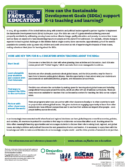How can the Sustainable Development Goals (SDGs) support K-12 teaching and learning?
Download the Fact Sheet! (473.15 kB / pdf)
DownloadIn 2015, all 193 countries of the United Nations along with scientists and political leaders agreed to partner together to implement the Sustainable Development Goals (SDGs) by the year 2030. The SDGs are a set of 17 goals aimed at achieving peace and prosperity worldwide by addressing pressing issues such as climate change, quality education, and poverty, to name a few. Issues such as these are expected to have devastating impacts on people and the planet if not addressed. For example, climate change is expected to lead to global challenges in this lifetime that no single country alone can resolve. Approximately 42% of the world’s population is currently under 25-years-old, children and youth are at most at risk of experiencing the impacts of these issues, making schools an ideal place for learning about the SDGs.
HERE ARE KEY TIPS FOR K-12 EDUCATORS WHEN TEACHING ABOUT THE SDGs:
1. Start Small
Choose one or a few SDGs to start with when planning class activities and discussions. Each SDG also comes paired with “Global Targets,” which can make them more manageable to address.
2. Learn alongside your students and connect with their interests
Students are often already passionate about global issues, and the SDGs provide a way for them to learn how to become active global citizens. Take the opportunity to learn about what your students are passionate about and build activities, projects, and discussions around these.
3. Find ways to connect the SDGs to the curriculum
The SDGs can enhance the curriculum by making space for learning about global issues and including perspectives from people around the world, which are often left out of national curriculums. There are many resources available for teachers that can be used as content for teaching the SDGs across subject areas.
4. Partner with other classrooms around the world
There are programs where you can partner with other classrooms locally or in other countries to work on projects that address global issues. This gives students an engaging opportunity to learn from other students who have different perspectives and to see how their actions can impact other people – even people halfway across the world.
In an increasingly interconnected world where local and regional decisions can have global impacts on world economies, policies, and societies, it’s evermore important for countries to find ways to collaborate on issues that affect us all. Teaching about the SDGs offers meaningful learning opportunities and encourages students to discover their role in solving local, regional, and global issues. As today’s children and youth will become the next generation of voters and leaders, it is necessary to equip them with the knowledge and skills to make sound decisions in an increasingly complex world – and the SDGs provide a framework to do just that.
Read More
- Creating education goals and activities that help students have a planetary or global view. This moves education beyond merely providing skills for individuals’ future employment but instead, provides the knowledge and skills for living on a shared planet.
- Engaging students around the world in shared research and collaboration to identify different experiences and responses to global issues (see for example, the Global Classroom projects on Global Citizenship and Energy Futures)
- Accessing portals of research and information shared by people around the world as the content for learning. For example, the work of South Korean APCEIU
- Teaching students from an integrated curriculum approach that makes space for learning about global issues from multiple perspectives including from people in locations often left out of national focused curriculums. This will include building a global historical consciousness (see for example https://historicalthinking.ca)

